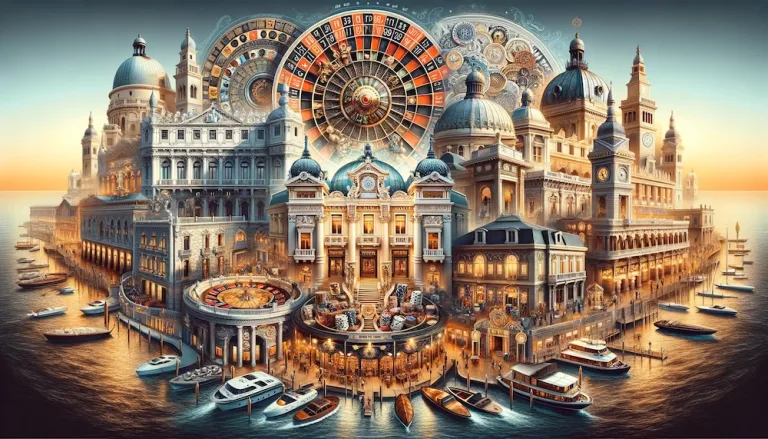Europe, with its rich history and diverse cultures, has long been a bastion for some of the world’s most renowned casinos. From the opulent halls of Monte Carlo to the historic gaming rooms of Baden-Baden, the continent’s gambling establishments have stories as intriguing as the games they host. This article embarks on a journey through time to explore the origins and evolution of Europe’s most iconic casinos.
The Dawn of Casino Culture in Europe: Venice’s Ridotto
The genesis of casino culture in Europe can be traced back to Venice, Italy, in 1638. The Ridotto, established by the Great Council of Venice to provide controlled gambling during the carnival season, is recognized as the world’s first legal casino. Housed in the Palazzo Dandolo, the Ridotto set the precedent for the modern casino industry, offering a variety of games of chance to its distinguished clientele until its closure in 1774.
Monte Carlo: The Jewel of Monaco
Monte Carlo Casino, officially named Casino de Monte-Carlo, is undoubtedly one of Europe’s most famous gambling establishments. Opened in 1863 in the Principality of Monaco, it was part of a strategy by the ruling Grimaldi family to avoid financial ruin. Designed by Charles Garnier, the architect of the Paris Opera, the casino has become synonymous with luxury and European gambling culture, attracting the elite and contributing significantly to Monaco’s economy.
Germany’s Oldest: Casino Baden-Baden
Nestled in the Black Forest region, Casino Baden-Baden represents Germany’s rich gambling heritage. Opened in 1824, it quickly became a gathering spot for Europe’s social elite. With its lavishly decorated interiors inspired by French palaces, Baden-Baden was hailed as “the most beautiful casino in the world” by Marlene Dietrich. It remains a symbol of the opulence and sophistication of 19th-century European casinos.
The United Kingdom: Clermont Club and Beyond
While the United Kingdom has a long history of gambling, the Clermont Club in London’s Mayfair district stands out for its exclusivity and prestige. Opened in 1962 by John Aspinall, it was frequented by British aristocracy and celebrities. Although the Clermont Club has seen its share of ups and downs, it epitomizes the UK’s contribution to the casino industry, alongside newer establishments like the Hippodrome Casino in London, which blend historical charm with modern gaming.
France: Casino Le Croisette in Cannes
France has made significant contributions to casino culture, not least through the development of roulette. One of its most celebrated casinos, Casino Le Croisette, is located in Cannes. Opening its doors in the early 20th century, it has become a landmark on the French Riviera, offering a glamorous gambling experience amidst the backdrop of the Cannes Film Festival.
Spain’s Casino Legacy: Casino de Madrid
Spain’s casino history is embodied by Casino de Madrid. Founded in 1836 as a social club, it transitioned into a gambling establishment in the late 19th century. Located in the heart of the Spanish capital, it combines gaming with cultural activities, showcasing the Spanish approach to gambling as part of a broader social experience.
Eastern Europe’s Gem: Casino Poland in Warsaw
As the casino industry expanded across Europe, Eastern European countries began to establish their own notable gambling venues. Casino Poland in Warsaw, established in the late 20th century, represents the region’s burgeoning casino scene. It has played a crucial role in introducing modern casino culture to Eastern Europe, offering a mix of traditional and contemporary games.
Conclusion: Europe’s Diverse Casino Heritage
The casinos of Europe are more than just places of gambling; they are monuments to the continent’s rich social, cultural, and architectural history. From the Renaissance halls of Venice’s Ridotto to the modern gaming floors of London and Warsaw, these establishments tell the story of Europe’s evolving relationship with luck, leisure, and luxury. As the casino industry continues to grow and adapt to new technologies and trends, the legacy of these iconic venues ensures that Europe will remain at the heart of the global gambling scene for generations to come.
The journey through Europe’s casino heritage highlights not just the evolution of gambling practices, but also the unique cultural and historical significance of each establishment. As the continent looks to the future, these casinos remain emblematic of Europe’s enduring allure and its capacity to blend tradition with innovation.

David Garato is a luminary in gaming journalism, renowned for peeling back the curtain on the gaming world with his witty and insightful commentary. A decade into weaving stories from the pixelated edges of indie games to the expansive universes of AAA titles, David’s work is a thrilling blend of analysis and adventure. When not writing, he’s live-streaming, sharing his gaming exploits with an engaged and growing audience. David doesn’t just write about games; he lives them, making him a trusted guide in the gaming community.


